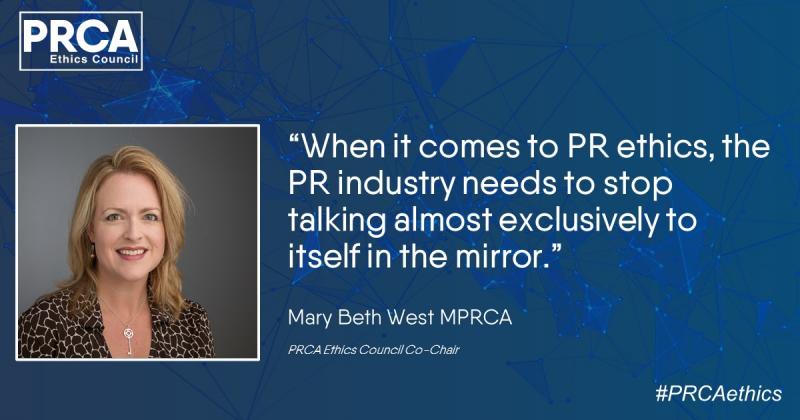
One of the most fulfilling aspects for me of working in the public relations field these past 25+ years has been the opportunity to collaborate across management disciplines.
The more that we in PR work closely and collaboratively with colleagues in the legal arena, HR, R&D, finance, operations, etc., the more we break down silos and learn to speak these other colleagues’ disciplinary languages.
I enjoy the challenge of gathering other management professionals’ insights about what constitutes best-practice from their disciplines’ own vantage points.
Likewise, it’s rewarding to share and advocate PR perspectives with them, pertaining to any opportunity or challenge that we must tackle together, in service to the organization.
In the process, we in PR can broker external colleagues’ understanding, appreciation and (hopefully) respect for the language (and action!) of PR Ethics and the shared value systems of our global PR industry.
What’s fascinating to me: the points of alignment and the points of contention that can emerge, when the PR side of the house advises the CEO and (hopefully) even the Board, alongside other C-Suite leaders with differing points of view.
It’s not uncommon for everyone to join forces on big ideas surrounding critical end-games (examples: make a profit; gain competitive market share; substantively elevate the stock price).
But where PR sometimes locks horns with those from other disciplines is the question of “How?” (as in, how are we going to make a profit, best our competitors, build a compelling investor story for the street?... To what extent are we willing to go?).
Issues of ethics are fundamental and – I dare say, non-negotiable – in answering these questions.
Clarification: the answers themselves might be negotiated amongst colleagues internally; but there is no negotiating the realities that these ethics questions indeed exist … and that to ignore them as if they don’t exist is tantamount these days to executive malpractice.
The points of alignment / contention – and the maelstrom therein – must be considered, navigated, negotiated, and ultimately, squared not only with the profit motive but also with short-term and long-term brand reputational impact.
If competent PR counselors – replete with ethical backbone – are not included as part of these conversations, then C-suites’ and boardrooms’ answers to the aforementioned questions (including that most-looming Q: “To what extent are we willing to go?”) can start veering sideways rather quickly into group-think… potentially far afield from acceptable standards of public expectation.
And as we all know, the public is in no way bashful about expressing their expectations nowadays… and punishing brands that fail to listen.
There is a status-quo issue – and perhaps even an existential issue – that we’re confronted with as a global PR industry:
Are we in PR building the required relationships of credibility and respect with (let’s face it) mostly quantitatively driven colleagues of other disciplines, who often set communications mandates from on-high?
Are we consistently advising and advocating PR principles beyond those happy scenarios of full interdisciplinary alignment, to include the most contentious of internal decision-making scenarios?
When it comes to PR ethics, the PR industry needs to stop talking almost exclusively to itself in the mirror.
Yes, we do have practitioners in our industry who don’t represent the industry well in the name of “public relations.” They are hardly in the majority, however. In my view, the genesis of PR’s biggest ethics challenge likely isn’t from within.
Instead, the most significant and commonplace challenge to PR hinges on external pressures from other management disciplines, including many C-suite colleagues whose own practical focus may include neither awareness nor concern about the PR / reputational impacts and implications of their own management decisions and directives.
Such external management pressures bear down on countless PR practitioners daily to message, defend, deflect or even dis-inform stakeholders, as certain management cultures mandate.
To address these core issues of The Disinformation Age and of PR ethics decay, we must begin with root-causes.
And that means delving into cross-disciplinary dynamics and certainly issues of organizational culture.
In the year ahead, I am honored to join Nitin Mantri and Israel Opayemi in co-chairing the PRCA Ethics Council, with this systemic aim in view.
Please stay tuned as we open up a range of conversations within the PRCA and the entire industry, including dialogues that bridge gaps between management functions. There will be opportunities to share data, lend voice, get involved and expand PR’s positive influence across disciplines, from a position of strength.
We look forward to you joining us, at #PRCAethics.
Based in the United States at Fletcher Marketing PR, Mary Beth West, MPRCA, can be followed on Twitter at @marybethwest, and contacted directly at mb@marybethwest.com.
